Related Research Articles
The legal status of transgender people varies greatly around the world. Some countries have enacted laws protecting the rights of transgender individuals, but others have criminalized their gender identity or expression. In many cases, transgender individuals face discrimination in employment, housing, healthcare, and other areas of life.

Name change is the legal act by a person of adopting a new name different from their current name.

The Gender Recognition Act 2004 is an act of the Parliament of the United Kingdom that allows adults in the United Kingdom who have gender dysphoria to change their legal gender. It came into effect on 4 April 2005.

Transgender rights in Canada, including procedures for changing legal gender and protections from discrimination, vary among provinces and territories, due to Canada's nature as a federal state. According to the 2021 Canadian census, 59,460 Canadians identify as transgender. Canada was ranked third in Asher & Lyric's Global Trans Rights Index in 2023.

Lesbian, gay, bisexual, transgender, and queer (LGBTQ) rights in the Republic of Ireland are regarded as some of the most progressive in Europe and the world. Ireland is notable for its transformation from a country holding overwhelmingly conservative attitudes toward LGBTQ issues, in part due to the opposition by the Roman Catholic Church, to one holding overwhelmingly liberal views in the space of a generation. In May 2015, Ireland became the first country to legalise same-sex marriage on a national level by popular vote. The New York Times declared that the result put Ireland at the "vanguard of social change". Since July 2015, transgender people in Ireland can self-declare their gender for the purpose of updating passports, driving licences, obtaining new birth certificates, and getting married. Both male and female expressions of homosexuality were decriminalised in 1993, and most forms of discrimination based on sexual orientation are now outlawed. Ireland also forbids incitement to hatred based on sexual orientation. Article 41 of the Constitution of Ireland explicitly protects the right to marriage irrespective of sex.
A legal name is the name that identifies a person for legal, administrative and other official purposes. A person's legal birth name generally is the name of the person that was given for the purpose of registration of the birth and which then appears on a birth certificate, but may change subsequently. Most jurisdictions require the use of a legal name for all legal and administrative purposes, and some jurisdictions permit or require a name change to be recorded at marriage. The legal name may need to be used on various government issued documents. The term is also used when an individual changes their name, typically after reaching a certain legal age. A person's legal name typically is the same as their personal name, comprising a given name and a surname. The order varies according to culture and country. There are also country-by-country differences on changes of legal names by marriage. Most countries require by law the registration of a name for newborn children, and some can refuse registration of "undesirable" names.
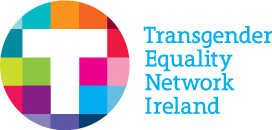
Transgender Equality Network of Ireland (TENI) is an Irish nonprofit organisation founded in 2006, which seeks to improve conditions and rights for transgender people and their families in Ireland.

Intersex people are born with sex characteristics, such as chromosomes, gonads, or genitals, that, according to the UN Office of the High Commissioner for Human Rights, "do not fit typical binary notions of male or female bodies."

Intersex people are born with sex characteristics, such as chromosomes, gonads, or genitals that, according to the United Nations Office of the High Commissioner for Human Rights, "do not fit typical binary notions of male or female bodies".
Transgender rights in Australia have legal protection under federal and state/territory laws, but the requirements for gender recognition vary depending on the jurisdiction. For example, birth certificates, recognised details certificates, and driver licences are regulated by the states and territories, while Medicare and passports are matters for the Commonwealth.

Multiple countries legally recognize non-binary or third gender classifications. These classifications are typically based on a person's gender identity. In some countries, such classifications may only be available to intersex people, born with sex characteristics that "do not fit the typical definitions for male or female bodies."
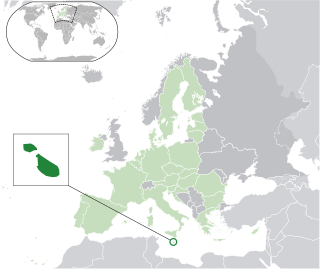
Intersex rights in Malta since 2015 are among the most progressive in the world. Intersex children in Malta have world-first protections from non-consensual cosmetic medical interventions, following the passing into law of the Gender Identity, Gender Expression and Sex Characteristics Act in 2015. All Maltese intersex persons have protection from discrimination. Individuals who seek it can access simple administrative methods of changing sex assignment, with binary and non-binary forms of identification available.
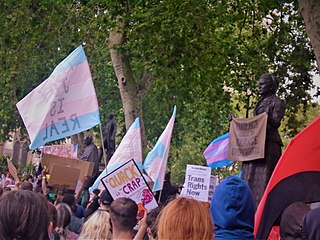
Transgender rights in the United Kingdom have varied significantly over time.
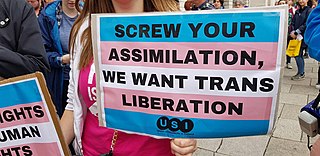
A citizen of Ireland is legally permitted to change the designation of their gender on government documents through self-determination. In 2015, Ireland was the fourth state in the world to permit such alterations to government documents. By May 2017, 230 people had been granted gender recognition certificates under the law. Section 16 of the Act entitles the holder of a gender recognition certificate to apply to have the certificate amended if there is a clerical error or an error of fact in the content of the certificate. Two such corrections have been made since commencement of the Act.

Transgender rights in the Federal Republic of Germany are regulated by the Transsexuellengesetz since 1980, and indirectly affected by other laws like the Abstammungsrecht. The law initially required transgender people to undergo sex-reassignment surgery in order to have key identity documents changed. This has since been declared unconstitutional. The German government has pledged to replace the Transsexuellengesetz with the Selbstbestimmungsgesetz, which would remove the financial and bureaucratic hurdles necessary for legal gender and name changes. Discrimination protections on the basis of gender identity and sexual orientation vary across Germany, but discrimination in employment and the provision of goods and services is in principle banned countrywide.

Gender self-identification or gender self-determination is the concept that a person's legal sex or gender is determined by their gender identity without any medical requirements, such as via statutory declaration.

The Gender Recognition Act was adopted by the Norwegian parliament, the Storting, on 6 June 2016, was promulgated by the King-in-Council on 17 June and took effect on 1 July 2016. Under the act citizens may change their legal gender by notification to the National Population Register. The act was proposed by the Conservative-led government of Erna Solberg and received multi-partisan support from over 85% of all voting MPs representing parties ranging from the conservatives to the left-socialists. It was welcomed by the LGBTIQ+ organizations, the feminist movement and human rights experts as a milestone for LGBTIQ+ rights, bringing Norway in line with international best practice in this area under international human rights law.
In some countries, a gender recognition certificate is a vital record to indicate a legal change of gender identity. This is distinct from a birth certificate, which is often amended in various countries following a legal gender change.
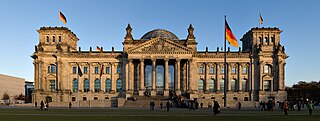
The Transsexuals Act was a German federal law that allowed people who did not feel they belonged to their gender to change their first name and gender in their civil status.
References
- ↑ Hofflich, Jessica (20 July 2015). "Ireland passes bill allowing gender marker changes on legal documents". GLAAD. Archived from the original on 10 September 2015. Retrieved 12 September 2015.
- ↑ "Gender Recognition Certificate". Department of Social Protection. 22 April 2021. Retrieved 13 November 2015.